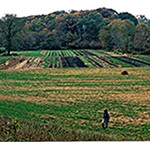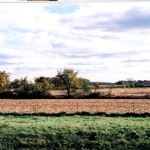Traditional and Conventional Growing
- "Organic Farm In Illinois"
- "Farm Land in Paducah Kentucky"
It wasn’t very long ago that I found out that people who farm with the aid of chemical pesticides and chemical fertilizers call themselves Conventional Farmers. That is good to know. We call ourselves Organic, or Natural which is the word I now lean towards more often. Organic is good, but as with everything else that gets big enough to be (re)defined by the FDA or the USDA that word is less meaningful. It has lost some of its purity.
I find myself carefully reading the content labels of food labeled Organic. I search for the origin state or country of the produce marked Organic in the grocery store. It’s not just that the word Organic is being redefined, it is also that there is more these days to my concerns with food than just whether or not pesticides and chemical fertilizers have been applied. Don’t get me wrong, I still care about those things, but there is more. I care to find food that has been grown in my home state, and was only recently harvested. I care that the meat, eggs, and dairy products I consume were raised humanely and on the pasture. I care that the farm that grew or produced my food used sustainable farming systems, and was a steward of the ecology in and around the farm.
The state of our current economy is unsustainable. Our energy sources and rate of energy consumption are unsustainable. Our food supply system as well as our conventional agricultural practices are also unsustainable. To be sustainable means that we can generate the stuff of our needs without depletion or ruination. We are either on course for destroying ourselves, or we are on a course for sustainability. My choice is for sustainability. I can not take giant steps in reducing my personal consumption, but every day I take small steps toward sustainable living practices, and I see my neighbors doing the same.
Before the second world war, before we figured out how to chemically fix nitrogen (which we learned to do btw in order to make bombs.) farmers had to grow naturally. In 1929 when our country fell into The Great Depression farm families fared far better than city dwellers. (Yes, I do know about the great dust bowl of the 1930’s. I have to say that those farm families lost it all. I guess I know what my next article has to be.) In 1900 50% of our nations population lived on family farms. Today just 2% of our population lives on a farm.
I have been thinking a whole lot about those early farms. They were sustainable farm systems. They had to be to make it. I imagine how it must have been when after the second world war farmer’s kids began bringing chemical fertilizers and pesticides on the farm for the first time and how well they would have performed at first in the old established farm soil built up from years of composting and manuring. Those kids who would be 80 to 100 years old today thought they had brought in a new and better way of farming, and the initial evidence would have supported that idea. They couldn’t have known that those chemical fertilizers and pesticides would kill the life in their soil, and foul their water. Their parents, and grandparents would have looked on in amazement imagining that their way had become obsolete, that their guiding principles for farming were no longer important. I can imagine they themselves might have felt obsolete. But were they? That was the birth of the Conventional Farm.
Today there is a return to sustainable farming practices. It turns out that sustainable farming is the most practical way for a farmer to make a profitable farm business, have a positive effect on the environment, and garner the support of the surrounding community.
Now I imagine the Conventional farmer of today constantly fielding requests for organically grown food he isn’t growing. He is loosing his arse every year buying tons of chemical fertilizers and gallons of pesticides and herbicides all the while knowing that practice is putting his hard earned dollars into the pockets of the petroleum industry. He knows his soil is dead..it has been for as long as he can remember, and it takes more and more chemicals and too much watering to prop up his crops in that dirt. His credit is maxed out. The bank quit loaning him money this year. The community as well as the EPA and the DEP are breathing down his neck because his chemical runoffs are poisoning the watershed system, and he has a growing pile of waste manure from his livestock that he has to pay to have hauled off before it too washes down into the canal nearby. Everything he has known and embraced as knowledge about farming is crumbling before him. Or he is a giant corporate farmer, and the government is subsidizing him to continue to produce food that is priced at less than it costs to produce it.
I see the cycle turning full circle. I can imagine that the conventional farmer could feel the same obsolescence his grandparents felt 60 years ago. Sustainable farming is resurfacing, but he does not need to feel obsolete, he can go to his local Agricultural Extension Agent and ask for an evaluation and a plan for sustainability because sustainable farming will set him free. Help is out there for the farmer who wants to convert his farm to a sustainable model.
Please understand that sustainable farming and organic farming are not the same things, but buying pallet loads of chemical fertilizers while dumping livestock manures and bedding are not sustainable practices. Sustainability is an exciting step toward profitability that farmers can get enthusiastic about, and I think a natural next step is to Organic, or Natural farming practices.
In a week or so I am attending the SSAWG (Southern Sustainable Agriculture Working Group) Conference in Chattanooga Tennessee, so expect to read much more about Sustainable Farming here in the next month or so.
Happy Growing



3 Responses
Hey,
Here’s a sustainability question you might be able to help with.
Rainwater harvesting is becoming ever more relevant – probably even more so in the drier parts of the US than here in Ireland.
We’re told we should not drink rainwater without first filtering it through, for example, ozone (O3). But can we feed it to animals, e.g. dairy cows ?
Thanks,
Barry in Ireland.
Hi Barry thanks for reading, and for your question. I may change this answer after I return from the SSAWG Conference. I am not an expert on this but here goes: We catch our rainwater here in Florida. I have a gutter down spout that feeds directly into my fish pond. I water my plants with rain water, and cows in the pasture drink rain water that is caught in their watering troughs and ponds although they are beef cattle. I consider that dairies may be more persnickety about what their cows consume lest it taint the milk. Animals usually drink water we would not consider safe for ourselves. Their systems may be more tolerant than ours are. I don’t know how it is in Ireland, but when it comes to food and water consumption in this country we are over protected. Did you know that in this country a fresh egg that was not washed in a bleach solution before it was packaged to sell must be labeled “for pet consumption only”? It is the same for raw milk it must be labeled for pet consumption only to be sold in the market. Much of the fresh food I most want to consume is contraband in my country. Are Ireland’s food distribution regulations like that too?
I like your vibe. Nothing more to say.